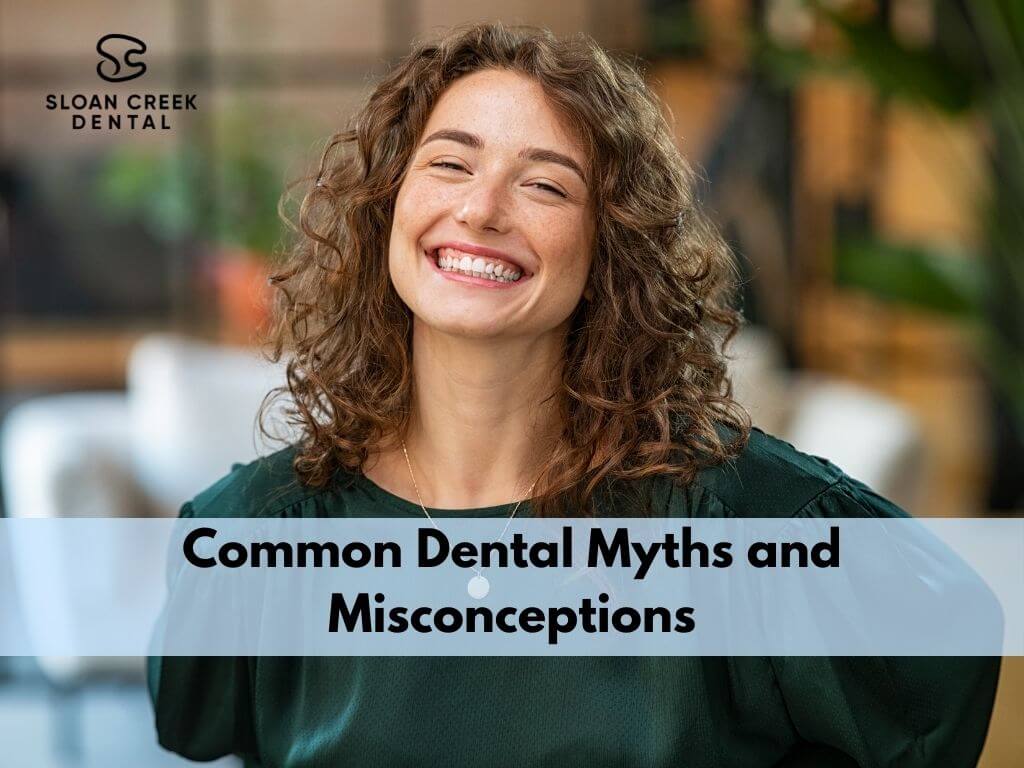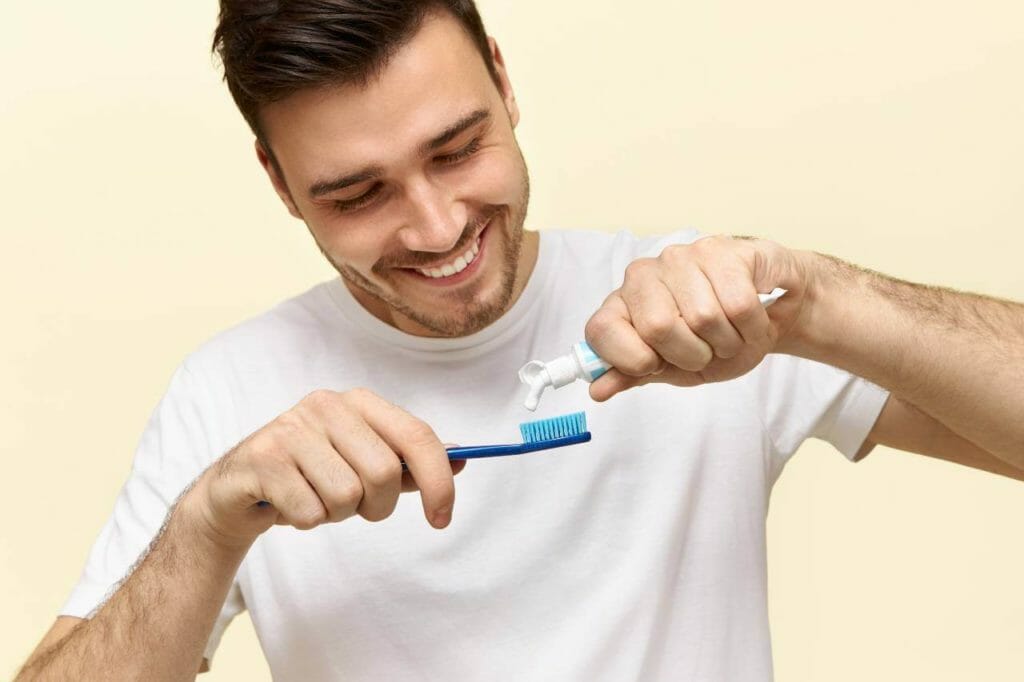
There are many different treatment options for a healthy smile, and it isn’t easy to generalize what works best. However, there are several common misconceptions that many people have regarding oral health that could lead to unintended problems if they aren’t addressed. At Sloan Creek Dental, we have your best interests at heart, and this guide can help you avoid some common dental myths about your oral health.
Some people believe they are destined to lose their teeth due to family history, but this is not the case. Tooth loss is absolutely preventable. In most situations, tooth loss is primarily due to poor oral hygiene and dental problems such as cavities. When cavities go untreated, the result can be tooth loss.
The simple answer: no. Sugar itself does not cause cavities, but it can contribute to the bacteria that cause tooth decay. Bacteria feed on sugar and produce acid—which is what damages your teeth when you eat food or drink beverages that are acidic. To avoid this kind of damage, brush your teeth twice a day with proper brushing techniques and use fluoride toothpaste. Flossing is also important, as it helps remove food particles from between your teeth where you can’t brush them effectively. And don’t forget to visit the dentist every six months for regular checkups and cleanings!
Bleeding gums are not normal, and you should contact your dentist to get an exam to see how they can help put a plan in place for healthy teeth and gums! In general, bleeding gums can be caused by inflammation of the gums. This can be due to excessive plaque buildup, the onset of gingivitis, or gum disease.
No, brushing harder doesn’t clean your teeth better. In fact, it’s more likely to damage your teeth and gums. Here’s why: Brushing too hard can wear down the protective layer of enamel on your teeth, exposing the sensitive dentin underneath. And that can lead to sensitivity and pain. In addition, brushing too hard can cause gum recession—when the gums pull back from the teeth—which makes the roots of your teeth more susceptible to decay.

False – Flossing is an important part of your oral health routine. Flossing isn’t just for your teeth. It can actually help you keep your whole body healthier. Here are some benefits of flossing.
Chewing sugarless gum is an excellent way to freshen your breath, but it’s not meant to replace regular brushing and flossing. If you’re looking for a long-term solution for bad breath or want to keep your teeth clean and healthy, chewing gum is definitely not enough. But if you’re looking for an easy way to get rid of bad breath right away—or if you just want to freshen up after lunch—chewing gum might be just what the doctor ordered!
Another benefit to sugarless chewing gum is it is shown to help reduce plaque. This is because chewing gum stimulates saliva production, which helps to wash away food debris and neutralize acids that cause cavities. It also helps to remove plaque from the teeth. However, chewing gum does not replace brushing or flossing—it’s best to use them all!
Not all white teeth are healthy. Whitening teeth can make them look better, but it won’t necessarily make them healthier. Teeth begin white and can become discolored over time due to staining or damage. Whitening your teeth may leave the underlying cause of discoloration unaddressed. If you notice your teeth aren’t looking as white as before, speak to your dentist about why.
Yes, kids need to brush their baby teeth (also known as primary teeth). The American Academy of Pediatric Dentistry recommends that children brush their teeth at around two years old with an age-appropriate toothbrush and toothpaste.
It’s important to make sure your child is brushing their teeth for at least 2 minutes twice a day. This is the most effective way of removing plaque from the surface of the tooth and keeping it healthy.
Brushing baby teeth isn’t just about cleaning them—it’s also about teaching your child how to care for their adult teeth (permanent teeth) as they grow up.
When you lose enamel on your teeth, the dentin underneath becomes exposed and sensitive. This makes it painful for you to eat certain foods or even brush your teeth without experiencing discomfort. It also weakens your teeth so that they’re more likely to decay if they’re exposed to bacteria in plaque or acids found in acidic foods like fruit juice or soda pop.
If you’re experiencing tooth sensitivity, it could be due to a number of different things. For example, some people experience it because they grind their teeth (bruxism) while they sleep or because they use an abrasive toothpaste. Don’t hesitate to talk to your dentist if you’re concerned about your symptoms.
Dental checkups should be a part of your and your family’s regular health routine. Even if you don’t notice anything wrong, it’s best to still schedule checkups because keeping your teeth healthy can prevent bigger problems in the future. The sooner you catch problems with your teeth, the easier it is to fix them.
When it comes to oral health, there’s a connection with your general health. A mouth full of cavities and periodontal disease (gum disease) can lead to bacteria entering the bloodstream and causing heart disease, diabetes, cancer, or other illnesses. Click here to learn more about how your oral health is linked to your overall health.
No, dental implants do not require special care. As with regular teeth, dental implants need to be brushed twice a day and flossed once daily. You should also visit your dentist biannually to make sure that your dental implants are still in good health.
The American Dental Association (ADA) has not found any evidence to support the safety or effectiveness of charcoal toothpaste, which may actually harm teeth and gums.
As your local family dentist near the Allen and Fairview area, we are here to help you with any questions or concerns that you might have about keeping your smile healthy. If you have any questions about other oral health myths, feel free to contact us and we’ll be happy to help with your oral care routine. To schedule your appointment, contact Sloan Creek Dental, and our friendly staff will be happy to assist you. You can reach us at our Fairview, TX dental office to schedule an in-person consultation with us today – 972-468-1440.
Our dental office is located in Fairview, Texas, and our patients visit us from across the surrounding areas, including Allen, Plano, McKinney, and Lucas.
We firmly believe that the internet should be available and accessible to anyone, and are committed to providing a website that is accessible to the widest possible audience, regardless of circumstance and ability.
To fulfill this, we aim to adhere as strictly as possible to the World Wide Web Consortium’s (W3C) Web Content Accessibility Guidelines 2.1 (WCAG 2.1) at the AA level. These guidelines explain how to make web content accessible to people with a wide array of disabilities. Complying with those guidelines helps us ensure that the website is accessible to all people: blind people, people with motor impairments, visual impairment, cognitive disabilities, and more.
This website utilizes various technologies that are meant to make it as accessible as possible at all times. We utilize an accessibility interface that allows persons with specific disabilities to adjust the website’s UI (user interface) and design it to their personal needs.
Additionally, the website utilizes an AI-based application that runs in the background and optimizes its accessibility level constantly. This application remediates the website’s HTML, adapts Its functionality and behavior for screen-readers used by the blind users, and for keyboard functions used by individuals with motor impairments.
If you’ve found a malfunction or have ideas for improvement, we’ll be happy to hear from you. You can reach out to the website’s operators by using the following email
Our website implements the ARIA attributes (Accessible Rich Internet Applications) technique, alongside various different behavioral changes, to ensure blind users visiting with screen-readers are able to read, comprehend, and enjoy the website’s functions. As soon as a user with a screen-reader enters your site, they immediately receive a prompt to enter the Screen-Reader Profile so they can browse and operate your site effectively. Here’s how our website covers some of the most important screen-reader requirements, alongside console screenshots of code examples:
Screen-reader optimization: we run a background process that learns the website’s components from top to bottom, to ensure ongoing compliance even when updating the website. In this process, we provide screen-readers with meaningful data using the ARIA set of attributes. For example, we provide accurate form labels; descriptions for actionable icons (social media icons, search icons, cart icons, etc.); validation guidance for form inputs; element roles such as buttons, menus, modal dialogues (popups), and others. Additionally, the background process scans all of the website’s images and provides an accurate and meaningful image-object-recognition-based description as an ALT (alternate text) tag for images that are not described. It will also extract texts that are embedded within the image, using an OCR (optical character recognition) technology. To turn on screen-reader adjustments at any time, users need only to press the Alt+1 keyboard combination. Screen-reader users also get automatic announcements to turn the Screen-reader mode on as soon as they enter the website.
These adjustments are compatible with all popular screen readers, including JAWS and NVDA.
Keyboard navigation optimization: The background process also adjusts the website’s HTML, and adds various behaviors using JavaScript code to make the website operable by the keyboard. This includes the ability to navigate the website using the Tab and Shift+Tab keys, operate dropdowns with the arrow keys, close them with Esc, trigger buttons and links using the Enter key, navigate between radio and checkbox elements using the arrow keys, and fill them in with the Spacebar or Enter key.Additionally, keyboard users will find quick-navigation and content-skip menus, available at any time by clicking Alt+1, or as the first elements of the site while navigating with the keyboard. The background process also handles triggered popups by moving the keyboard focus towards them as soon as they appear, and not allow the focus drift outside of it.
Users can also use shortcuts such as “M” (menus), “H” (headings), “F” (forms), “B” (buttons), and “G” (graphics) to jump to specific elements.
We aim to support the widest array of browsers and assistive technologies as possible, so our users can choose the best fitting tools for them, with as few limitations as possible. Therefore, we have worked very hard to be able to support all major systems that comprise over 95% of the user market share including Google Chrome, Mozilla Firefox, Apple Safari, Opera and Microsoft Edge, JAWS and NVDA (screen readers), both for Windows and for MAC users.
Despite our very best efforts to allow anybody to adjust the website to their needs, there may still be pages or sections that are not fully accessible, are in the process of becoming accessible, or are lacking an adequate technological solution to make them accessible. Still, we are continually improving our accessibility, adding, updating and improving its options and features, and developing and adopting new technologies. All this is meant to reach the optimal level of accessibility, following technological advancements. For any assistance, please reach out to